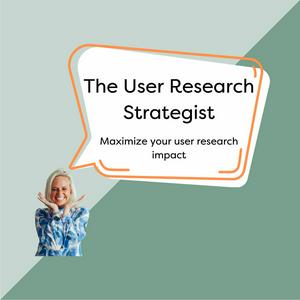Listen now on Apple, Spotify, and YouTube.—Brett Krajewski is the Vice President of Research & Growth at Accelerant Research, where he leads the research and client solutions teams, delivering innovative insights to empower businesses and many fortune 500 companies. He was most recently featured on an episode of Awkward Silences Podcast, and has some upcoming webinars. With a career spanning both in-house industry roles and consulting/agency leadership, Brett has built and led high-performing, multi-method research teams for Fortune 50 companies. His past roles include Head of Design Research: Customer at Walmart and Lead of Product Research at Lowe’s, where he drove customer-focused innovation and strategy. Beyond professionally, Brett has trained Seeing Eye dogs for the past 25 years, combining his love of service and animals, and is also a licensed pilot who enjoys navigating the skies somewhere new whenever possible. Brett’s unique blend of professional expertise and personal passions reflects his curiosity, drive, and commitment to making an impact.In our conversation, we discuss:* How Brett discovered triangulation only later in his career and why it changed everything about how he approached impact.* What meta-analysis actually means in practice, and why it’s an underrated starting point for faster, smarter research.* Why researchers need to stop acting like lone wolves and start working like strategic collaborators.* How to balance qualitative and quantitative data without waiting for things to be perfect.* The small, consistent actions that build trust and how they differ when you’re in-house versus agency-side.Some takeaways:* Early in his career, Brett saw research as “the answer.” Later, he realized that data triangulation, pulling from primary research, internal metrics, heuristics, and third-party sources, helped him tell richer, more balanced stories that actually got traction. It wasn’t about perfection or overloading people with data. It was about showing how user needs and business goals intersect, and building stories from multiple truths rather than a single source.* Rather than constantly commissioning new work, Brett champions meta-analysis, which involves reviewing what’s already been done across different departments. That might include past research, customer insights, agency data, or marketing reports. Doing this upfront reveals known truths, uncovers gaps, and often means you only need to research 2 out of 10 questions, not all 10. It makes you faster, more relevant, and a better partner to the business.* Trying to solve everything at once kills momentum. Brett advises researchers to start with small, tangible wins, like answering two key questions fast with an unmoderated test. Showing up early with something useful, rather than disappearing and delivering a polished report weeks later, builds credibility. These quick contributions earn you the right to do deeper, more strategic work down the line.* Too many researchers say they want a seat at the table, then go off and work solo. Brett emphasizes bringing stakeholders along for the ride and letting them weigh in, see progress, and feel ownership. That doesn’t mean caving to their agenda. It means understanding what they care about, folding it into your framing, and using that shared language to build alignment and influence.* One of the most powerful habits Brett adopted: releasing insights in milestones. Whether you’re in-house or agency, think in chunks, such as sharing the competitive analysis while you’re still synthesizing interviews. Share directional trends while still in the field. Transparency builds trust, helps teams move faster, and reminds everyone that research is ongoing, not just a one-time delivery. Show them how the sausage is made, not just the final plate.Where to find Brett:* LinkedIn* Transforming Insights into Results: Advancing influence in Corporate landscapes from the bottom up* Innovate or Imitate: Redefining Design and Research on our Terms Stop piecing it together. Start leading the work.The Everything UXR Bundle is for researchers who are tired of duct-taping free templates and second-guessing what good looks like.You get my complete set of toolkits, templates, and strategy guides. used by teams across Google, Spotify, , to run credible research, influence decisions, and actually grow in your role.It’s built to save you time, raise your game, and make you the person people turn to—not around.→ Save 140+ hours a year with ready-to-use templates and frameworks→ Boost productivity by 40% with tools that cut admin and sharpen your focus→ Increase research adoption by 50% through clearer, faster, more strategic deliveryInterested in sponsoring the podcast?Interested in sponsoring or advertising on this podcast? I’m always looking to partner with brands and businesses that align with my audience. Book a call or email me at
[email protected] to learn more about sponsorship opportunities!The views and opinions expressed by the guests on this podcast are their own and do not necessarily reflect the views, positions, or policies of the host, the podcast, or any affiliated organizations or sponsors. This is a public episode. If you'd like to discuss this with other subscribers or get access to bonus episodes, visit www.userresearchstrategist.com/subscribe



